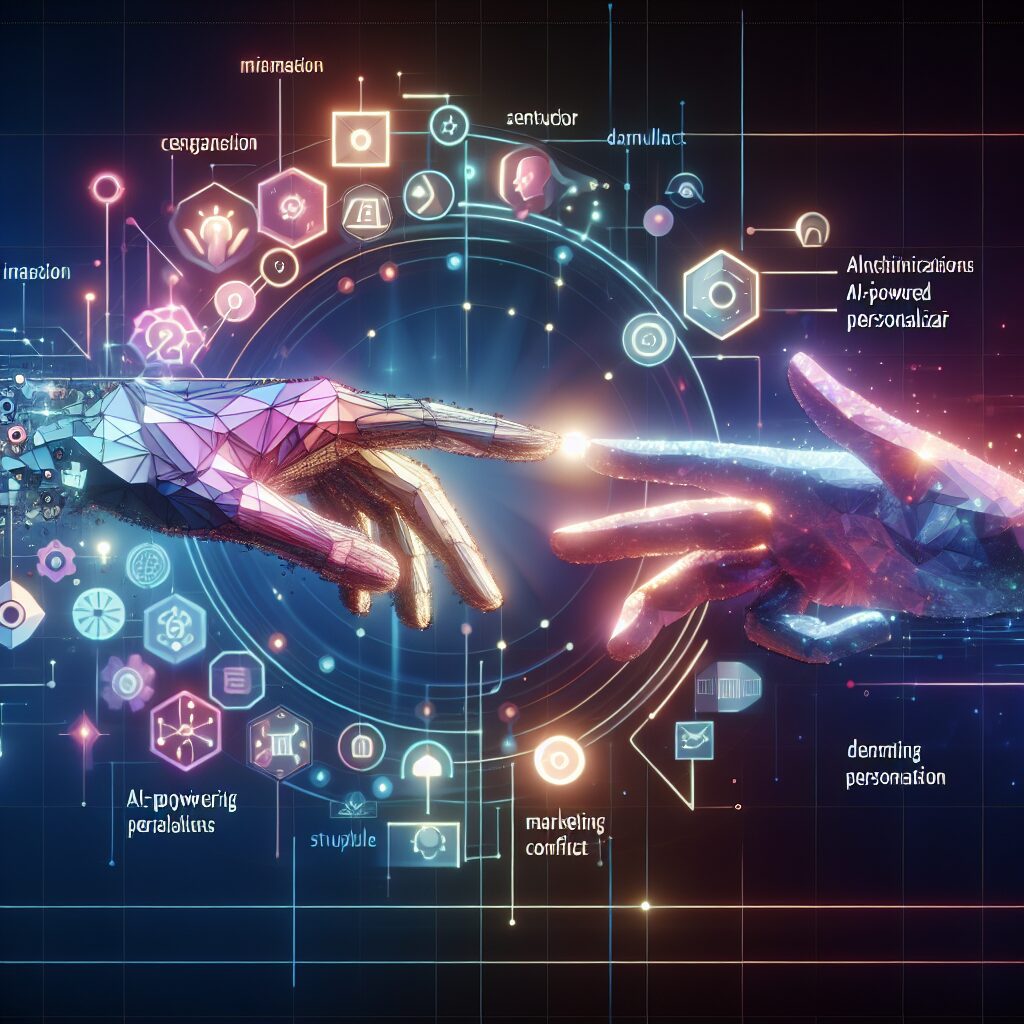
About eldris
At Eldris, we automate SEO, multilingual site expansion, and EU compliance for brands scaling across Europe. Our AI-powered platform handles everything from content publishing to regulatory docs—so you don’t have to.
In This Article
- Begin with clean, well-governed data as your AI foundation
- Adopt AI tools that match your engagement goals and integrations
- Use automation to provide real-time, relevant interactions
- Continually validate your models against bias and performance
- Monitor advanced KPIs like CLV and churn probability to optimise campaigns
- Ensure all AI-driven efforts comply with privacy legislation
- Balance automation with human authenticity for long-term engagement
- Future-proof your strategy by exploring innovations like generative AI and federated learning
- Lean on internal and external expertise when developing AI frameworks Learn more about AI-Driven User Engagement Strategies
- Stay ahead of trends by subscribing to curated AI industry insights Ultimate AI in digital marketing guide
Introduction to AI in User Engagement
Why AI Matters Now More Than Ever
The arrival of AI User Engagement has ushered in a transformative era for digital marketing, customer experience, and business performance. As consumers demand more relevant, timely, and consistent brand interactions, artificial intelligence offers a scalable solution that aligns with these expectations. AI-driven tools provide businesses with the ability to deeply understand user behaviour, predict preferences, and anticipate needs—often before the user expresses them outright. This proactive capability drives not only retention but also long-term customer loyalty, setting companies apart in fiercely competitive markets. As more industries embrace intelligent automation and personalisation, AI User Engagement is no longer a luxury—it is a strategic necessity.

The Evolution of Personalized Content Delivery
From Static Messages to Dynamic Experiences
Traditionally, content personalisation was limited to surface-level tactics, such as inserting a user’s name in an email greeting. However, AI has drastically deepened the scope and precision of content targeting. Using real-time data, machine learning algorithms can now identify patterns in user behaviour and align content delivery accordingly. For instance, an AI engine can determine the best time to send a product recommendation or suggest unique content formats based on a user’s device usage. This dynamic targeting creates hyper-personalised journeys that significantly increase engagement and minimise churn.
Advanced personalisation is no longer about demographic segmentation. It’s about context-driven prediction. AI assesses micro-moments—such as browsing history, purchase behaviour, and even mouse movement—to craft dynamic web pages, personalised push notifications, and location-aware communications. Brands embracing these capabilities offer seamless customer experiences that feel intuitive, relevant, and deeply tailored. As such, the role of AI User Engagement has expanded well beyond simple targeting to become the cornerstone of content delivery strategy.
Behavioral Analytics & Customer Data in AI
Turning Insights into Engagement
One of the most powerful aspects of AI User Engagement is its aptitude for behavioural analytics. By ingesting and interpreting large swathes of customer data, AI systems convert raw insights into actionable strategies. Analytics tools driven by machine learning assess click-through rates, session durations, conversion histories, and even emotional sentiment detected from social media activities. This deep contextual awareness enables marketers to craft messages and calls-to-action that resonate precisely with individual users.
Patterns previously invisible to human analysts are now unveiled by AI with incredible accuracy and speed. For example, if a user typically interacts with content in the evening, the AI adjusts email timings to maximise visibility. Likewise, predictive models warn of high churn-risk accounts, empowering marketers to implement retention tactics proactively. AI User Engagement ensures every decision is data-backed, context-smart and dynamically optimised, elevating overall marketing efficiency while enhancing the customer journey.
AI-Powered Automation and Real-Time Interactions
Chatbots, Email Triggers & Beyond
Automation lies at the heart of modern AI User Engagement. From instant customer service via chatbots to real-time email responses triggered by user actions, AI eliminates latency in communication and provides immediate value to users. Smart chatbots now use natural language processing (NLP) and sentiment analysis to offer human-like dialogue, resolve queries instantly, and guide users down the sales funnel with precision.
Similarly, automated email campaigns respond dynamically to user behaviour. A customer browsing a product category might receive a follow-up email minutes later, complete with a discount code or personalised recommendations. These AI-driven triggers ensure users are always engaged at moments that matter most. Real-time engagement not only drives conversions but also fosters a sense of attentiveness that strengthens brand loyalty. The beauty of automation lies not solely in speed but in precision—reaching the right user with the right message at the right time.
Best AI Tools for User Engagement Personalization
Top Platforms and How to Choose
Numerous AI platforms support personalisation efforts, but selecting the right tool depends largely on the organisation’s needs, budget, and tech infrastructure. Market leaders in this space include platforms like Salesforce Einstein, Adobe Sensei, and Dynamic Yield. Each offers AI-driven personalisation through different lenses—whether CRM-based, content-centric, or retail-optimised. Consider whether your priority is website personalisation, in-app engagement, or omnichannel orchestration when evaluating tools.
The best platforms offer predictive analytics, automated experimentation (such as A/B and multivariate testing), and integrations with existing marketing ecosystems. Features like real-time segmentation, smart content curation, and campaign performance analysis are crucial. Organisations must also weigh data compliance features, especially in regulated industries. Tool selection is not solely about features—it is about scalability, interoperability, and alignment with long-term digital strategy. AI User Engagement tools must enhance—not complicate—current workflows.
AI for Scaling Customer Loyalty Programs
Hyper-Relevant Rewards at Scale
Traditionally, loyalty programmes focused on simple point systems and one-size-fits-all rewards. AI disrupts this model by creating adaptive, intelligent programmes that recognise individual preferences, behaviours and engagement levels. AI evaluates historic purchasing data, social interactions, and feedback loops to dynamically tailor reward suggestions and retention tactics.
Retailers and service providers now offer AI-determined promotions such as birthday discounts, spend-based bonuses, or time-sensitive incentives targeted to past behaviours. More sophisticated systems combine location data with transactional history to deliver personalised offers at the point of need—for example, an in-store coupon surfaced on mobile when the customer approaches the store. This strategy ensures that rewards are always relevant and timely, dramatically increasing programme participation rates. AI User Engagement helps transform static loyalty schemes into vibrant, engaging ecosystems that evolve with user expectations.
Developing a Data-Centric AI Engagement Strategy
Frameworks and Best Practices
Building a successful AI User Engagement strategy starts with establishing a solid data foundation. Organisations must first identify which behavioural, transactional and demographic data points provide genuine insight. Integrating first-party data with third-party analytics significantly enriches user profiles and improves model accuracy.
Key best practices include data cleaning routines, cross-channel normalisation, and ethical data governance. Once data integrity is ensured, companies can implement AI frameworks like reinforcement learning, clustering algorithms, and predictive modelling. It is crucial to continually train these models based on evolving user behaviour. Likewise, deploying AI incrementally—beginning with a pilot and scaling up—helps minimise risk. An agile mindset proves invaluable here, facilitating rapid A/B testing, KPI measurement, and ongoing optimisation. Ultimately, a user-first approach, powered by well-governed data and intelligent automation, is the nucleus of sustainable AI User Engagement strategy.
Challenges in Implementing AI-Personalized Engagement
Data Privacy, Bias & Technical Limitations
Though promising, AI-driven personalisation comes with its share of challenges. One primary concern is data privacy. With regulations such as the UK GDPR and global equivalents tightening data usage policies, organisations must ensure compliance while maintaining intelligent engagement. Transparency, user consent, and anonymised data collection become non-negotiable prerequisites.
Algorithmic bias also presents a major hurdle. If the data used to train models reflects historical discrimination or lacks diversity, AI outputs risk reinforcing those biases. Mitigating bias requires continuous validation, diverse training data, and best-in-class governance protocols. Moreover, technical complexities like data silos, integration challenges, and legacy software limitations can obstruct scalability. Implementing AI User Engagement necessitates holistic operational alignment, pairing technical innovation with ethical responsibility and interdepartmental collaboration.
Metrics that Matter for AI Success
Tracking What Moves the Needle
Success in AI User Engagement is measured not only through engagement rates but also via deeper, outcome-oriented KPIs. Click-through rates (CTR), time-on-site, bounce rates, and conversion ratios remain foundational, but modern AI strategies also track Customer Lifetime Value (CLV), Net Promoter Scores (NPS), and Probability of Churn.
AI enables real-time performance monitoring across multiple channels, offering granular breakdowns of each touchpoint’s impact. Campaign effectiveness is no longer retrospective—it becomes iterative and continuous. Marketers can attribute ROI with far greater precision, adjusting messaging strategies based on live behaviour. Moreover, AI tools often include anomaly detection capabilities, identifying performance dips or engagement gaps before they manifest as revenue loss. In harnessing these analytics, businesses don’t just measure outcomes—they master them.
Future of AI in Marketing Personalization
What’s Next in Hyper-Engagement
The future of AI User Engagement points toward even more contextual, immersive, and human-like interactions. Emerging technologies such as generative AI, emotion recognition, and AI-driven voice personalisation will redefine how brands understand and communicate with users. Imagine a future where virtual assistants engage users with adaptive tone and vocabulary based on mood detection or where augmented reality experiences adapt based on gaze patterns detected through wearable devices.
Furthermore, federated learning offers a privacy-conscious way to evolve AI models without compromising raw user data. This innovation could unlock next-generation engagement levels while respecting user sovereignty. As AI capabilities broaden, marketers will need to focus on value creation, ethical use and maintaining the delicate balance between automation and authentic connection. The future isn’t just about smarter machines—it’s about more meaningful human experiences, intelligently delivered.
“With AI, we’re no longer guessing what engages users—we’re using data-driven intelligence to connect authentically and scale effectively.”
Conclusion: Roadmap to Smarter Engagement
AI User Engagement is redefining the relationship between brand and consumer. It replaces generic broadcasts with intelligent, two-way dialogue and scales personalisation to an unprecedented degree. To succeed in today’s market, companies must not only adopt AI tools but integrate them strategically—with robust data foundations, ethical guideline adherence, and clearly defined success metrics. As the digital era continues to evolve, embracing AI User Engagement is not just a competitive edge—it is an organisational imperative. For those ready to lead in this space, the time to act is now.
Great guide on mastering-the-art-of-ai-optimized-user-engagement – Community Feedback
How is AI used for customer engagement?
AI leverages algorithms to analyze user behavior and deliver personalized experiences such as smart chatbots, sentiment analysis, and tailored content, improving user satisfaction and loyalty.
How can AI enhance personalized content delivery?
AI studies user data to provide content aligned with individual preferences, resulting in more relevant messages, higher engagement, and improved marketing outcomes.
Which AI tool is best for digital marketing?
The best AI tools for digital marketing vary based on business needs, but popular solutions offer predictive analytics, automated content creation, and advanced personalization features.
How can AI be used to improve customer experiences?
AI can automate CRM processes, score leads, predict conversions, and enable real-time support, streamlining the customer journey and enhancing overall satisfaction.







